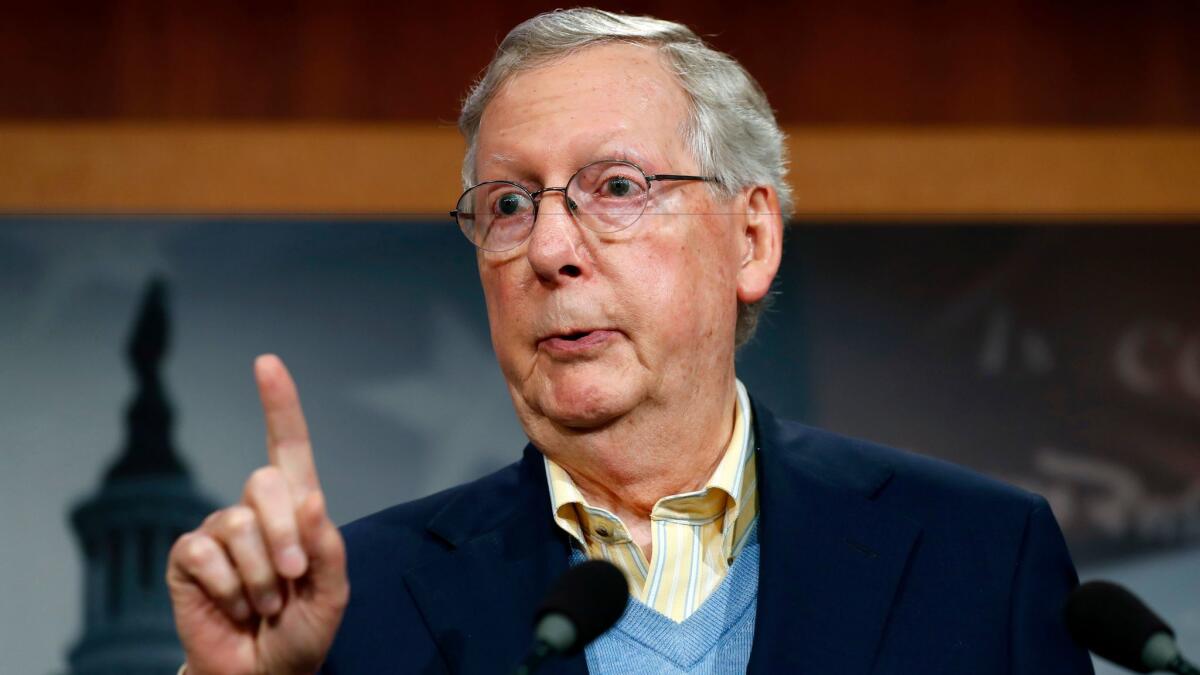Can Democrats take back the Senate? Possibly. Here’s how

- Share via
Suppose Joe Biden is elected president in November, but the Senate stays Republican. Or, suppose he loses, but the Democrats manage to take the Senate anyway.
If Americans vote the way they have in recent elections, both those eventualities are unlikely.
As the rift between the two parties, and that between their supporters, has grown to Grand Canyon dimensions, Americans have largely abandoned the time-honored practice of ticket-splitting. In the 2016 presidential election, every state that elected a Republican senator voted for Donald Trump for president, while every state that elected a Democratic senator voted for Hillary Clinton. Since the nation inaugurated the popular election of senators in 1913, that had never happened before.
Even in midterm elections, ticket-splitting — a pervasive feature of American voting throughout the 20th century — has gone into steep decline. Of the 21 states that elected both governors and senators in 2018, only five elected one from each party. In the three states that elected Democratic senators and Republican governors, those governors — Massachusetts’ Charlie Baker, Maryland’s Larry Hogan, Vermont’s Phil Scott — had each largely repudiated Trump and ran (and in Baker’s and Hogan’s case, already governed) as centrists.
So what does this portend when considering whether Democrats have any chance of flipping the Senate in 2020?
To oust Mitch McConnell from the post of majority leader, the Dems need to concentrate on states where Republican Senate seats are up for a vote and where Biden (or whoever becomes the Democratic nominee) has a good chance of winning.
That list certainly includes Colorado, where Republican Sen. Cory Gardner is widely regarded as the most endangered Republican incumbent. Next on the list of targets are three Republican senators from swing states: Arizona’s Martha McSally, North Carolina’s Thom Tillis and Maine’s Susan Collins. McSally and Tillis are both in their first terms, and neither appears to have instilled fervent loyalty in their state’s voters. Collins, of course, is a longtime favorite of Maine voters, having first won her seat in 1996, and may prove a more tenacious candidate.
Among the 12 currently Democratic-held seats on November’s ballot, only one — that of Alabama’s Doug Jones — is from a state that Trump carried in 2016, and is almost sure to carry again. Jones is in the Senate by virtue of a special election in which he had the great good fortune to have as his Republican opponent Roy Moore, the Bible-thumping friendship-cultivator of teenage girls.
Tuesday’s stunning victory for Doug Jones, Democrat of Alabama, is, for many pundits and party leaders, a vindication of an opinion they have held since Donald Trump took the stage at the 2016 Republican convention, and which was not shaken even by his defeat of Hillary Clinton: that the key to Democratic victory is in appealing to the better angels of conservatives, focusing on the ethical shortcomings or lack of decorum shown by Republican candidates like Roy Moore or President Trump.
As Jones cannot assume he’ll be that lucky this year (his Republican opponent will either be former Atty. Gen. and Sen. Jeff Sessions or Auburn head football coach Tommy Tuberville), prudent Democrats should assume that they’ll need to pick up four Senate seats to get to 50. Should Biden or another Democrat win the presidency, that would give them the narrowest of majorities, relying on the Democratic vice president to be the Senate’s tie-breaking vote. Should the ticket of Trump and Pence win reelection, Democrats will need 51 votes to block, for instance, the McConnell Senate’s ongoing confirmations of far-right judicial nominees.
What that means for Democrats is they’ll have to pour resources chiefly into the four states — Colorado, Arizona, North Carolina and Maine — where Republican senators are most endangered. Their likely nominees — former Gov. John Hickenlooper in Colorado, former astronaut Mark Kelly in Arizona, Maine House Speaker Sara Gideon and former state Sen. Cal Cunningham in North Carolina, who became the Democrats’ nominee in the March 3 primary — stand either in their party’s mainstream or a little to the right of it, much like Biden himself. If voters are persuaded to cast their ballots for Biden, they will likely vote for these Senate candidates as well.
After those states, it’s down to tougher prospects. In Montana, the popular Democratic Gov. Steve Bullock recently announced his candidacy against Republican Sen. Steve Daines. In Kansas, should Republicans nominate the far-right Kris Kobach, who lost to a Democrat in the 2018 gubernatorial election, the Democratic nominee would certainly have a shot. And if polls in October show a Biden blowout looming, Democrats might even be able to pick up seats in such currently improbable locales as Iowa and Texas.
And, of course, there is always also the chance of a sitting senator or two committing political suicide between now and the election. Just last week, two Republican senators on this year’s ballot cast votes that may have opened the door just a crack to a Democratic opponent. James Inhofe of Oklahoma and Ben Sasse of Nebraska were among the eight Republicans who voted against the $8.3-billion emergency appropriation of funds to increase unemployment insurance and paid sick leave for Americans who are ill from, or losing their jobs to, the coronavirus crisis. Oklahoma and Nebraska are the most Republican of states, but, depending on what happens with the coronavirus, voters may not appreciate that their senators backed the sanctity of laissez faire over the preservation of human life.
That said, how states will vote in Senate races depends heavily on how they will vote for president. Democrats seeking to dethrone McConnell should focus accordingly.
Harold Meyerson is a contributing writer to Opinion and editor at large of the American Prospect.
More to Read
A cure for the common opinion
Get thought-provoking perspectives with our weekly newsletter.
You may occasionally receive promotional content from the Los Angeles Times.










